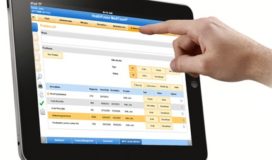
Benefits of Electronic Health Records
Electronic Health Records (EHR) is simply the digital form of the patient’s paper chart or its medical history. These records contain all the required information of the patient such as results from the lab like tests, allergy information, dates of immunization and medication relevant to the patients etc.
Benefits of Electronic Health Records
Some of the major benefits of Electronic Health Records (EHR) in day-to-day life include:-
Providing Complete And Accurate Information
EHR is a digital system in which all the data about the patient is automatically managed. This allows both the patient and the physician to have access to the accurate and up-to-date information. Accurate and complete medical information about the patient health further eliminates the chances of wrong medication.
EHRs promote accuracy by reducing the likelihood of duplicate or conflicting records. With paper-based systems, it’s not uncommon for patients to have multiple charts in different locations, leading to fragmented and incomplete information. EHRs consolidate all relevant data into a single, electronic record, minimizing the risk of errors and ensuring continuity of care across different healthcare settings.
Quick Access To Patient Records
EHR has made the data management smoother for the clinic as well as for the patients. As these records are managed digitally there is no involvement of heavy paperwork and bulky files. The patient chart can be easily accessed by the simple click of the mouse. Patients also don’t need to bother about their laboratory receipts or prescription slips, as all such information is already stored in the system.
With a few clicks, physicians can access a wealth of information, including medical history, laboratory results, imaging studies, and notes from previous encounters. This comprehensive view of a patient’s health status allows providers to detect patterns, identify risk factors, and make connections that might otherwise be missed with paper-based records.
Effective Diagnosing
EHR has not only reduced the burden of paperwork but also made diagnosing more effective. The quick access to accurate data has reduced the medical errors and offered a more accurate care to the patients.
Moreover, EHRs often come equipped with decision support tools that assist healthcare providers in the diagnostic process. These tools can range from clinical guidelines and best practice alerts to sophisticated algorithms that analyze patient data to suggest potential diagnoses or treatment options. By leveraging these decision support features, healthcare providers can enhance diagnostic accuracy and reduce the likelihood of errors.
Health Care Convenience
EHRs improve the health care quality. These also make health care more convenient for providers and patients. The system provides enhanced decision support, clinical alerts, and reminders as well as eliminates the need for filling forms and visiting clinic a number of times. You can directly call and fix your appointment by sharing your data with the clinic with the help of EHR.
Furthermore, EHRs facilitate communication and collaboration among members of the healthcare team, enabling specialists, primary care physicians, nurses, and other providers to share insights and contribute to the diagnostic process. This interdisciplinary approach fosters a holistic understanding of the patient’s condition and ensures that all relevant information is considered in the diagnostic decision-making process.
Privacy And Security Of Patient Data
The patient record in Electronic Health Records is more secured and systematic. There are various tools that have been developed under the health IT system allowing users to keep their health data safe and secured.
EHR systems employ robust authentication mechanisms such as passwords, biometric identifiers, and two-factor authentication to ensure that only authorized healthcare providers can access patient records. Additionally, role-based access controls allow organizations to restrict users’ access to specific information based on their role and responsibilities, further safeguarding patient confidentiality.
Furthermore, EHRs incorporate encryption techniques to protect data both during transmission and storage. This encryption ensures that even if unauthorized individuals intercept the data, it remains indecipherable and unusable. Additionally, audit trails are often implemented within EHR systems to track access to patient records, providing a means for organizations to monitor and review user activity for any unauthorized access attempts.
Cost Efficient
One of the significant advantages of electronic health records (EHRs) is their cost efficiency, which stems from several key factors contributing to savings for healthcare providers and organizations.
Electronic health records almost eliminate the use of paper in the data management. This has not only saved the cost but also the labor involved in making these records safe. There is also no need for duplication of testing. For a patient, these records enhance the safety and give access to improved health due to proper medication.
Secondly, EHRs eliminate the need for physical storage space and associated expenses. Traditional paper-based medical records require dedicated storage facilities, which incur costs for maintenance, security, and space utilization. In contrast, EHRs store patient information electronically, eliminating the need for physical storage and reducing associated expenses.
Additionally, EHRs facilitate the efficient management of inventory and supplies by tracking usage patterns and automating reordering processes. This ensures that healthcare facilities maintain optimal levels of supplies while minimizing excess inventory and associated costs.
Better Decision Making By Healthcare Providers
Medical practitioners have always PRAISED electronic health records as these have reduced their burden. The system gives them automatic reminders for the medical tests of the patients and also shows the progress in their condition.
The accessibility to comprehensive patient information enables healthcare providers to make more informed decisions about diagnosis and treatment plans. For example, a physician can quickly review a patient’s medical history and current medications to avoid prescribing potentially harmful drug combinations. Additionally, EHRs facilitate communication and collaboration among healthcare teams, ensuring that all providers involved in a patient’s care have access to the same information.
Time Saver
In today’s life, the most important thing is time. Electronic Health Records are quite helpful in saving the time involved in the treatment of the patient. It allows doctors to communicate with their patients online and patients also need not visit the clinic many times as they can get the prescription directly.
By automating processes such as appointment scheduling, billing, and claims processing, healthcare facilities can significantly reduce administrative overhead costs. This efficiency not only saves time but also minimizes the risk of errors associated with manual data entry, ultimately leading to cost savings.
Sources:
- https://healthinformatics.uic.edu/resources/articles/the-benefits-of-electronic-health-records/
- https://www.healthit.gov/faq/what-are-advantages-electronic-health-records




